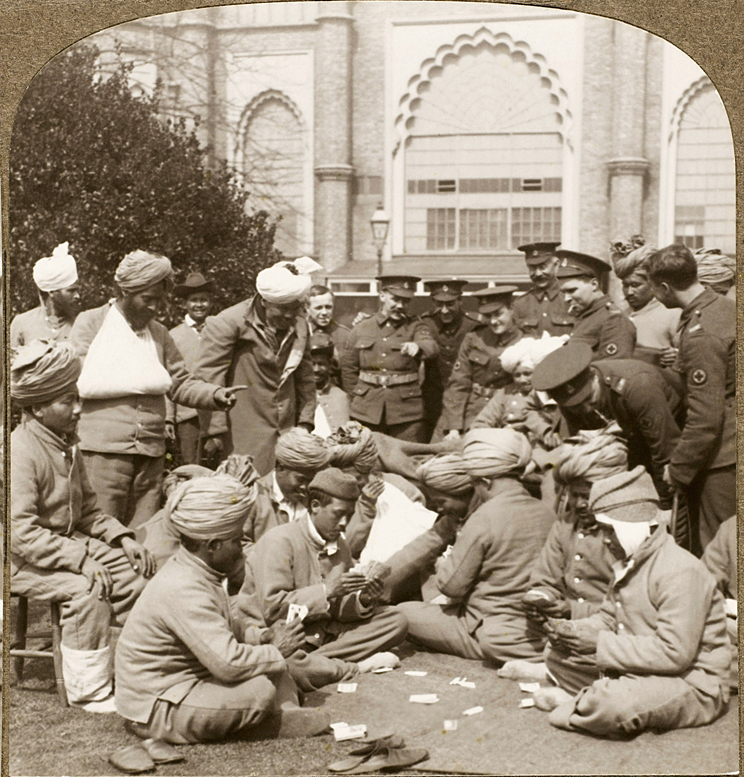A History of World Societies:
Printed Page 856
A History of World Societies Value
Edition: Printed Page 867
The War Becomes Global
In October 1914 the Ottoman Empire joined with Austria and Germany, by then known as the Central Powers. The Young Turks (see “Decline and Reform in the Ottoman Empire” in Chapter 25) were pro-
The entry of the Ottoman Turks pulled the entire Middle East into the war and made it truly a global conflict. While Russia attacked the Ottomans in the Caucasus, the British protected their rule in Egypt. In 1915, at the Battle of Gallipoli, British forces tried to take the Dardanelles and Constantinople from the Ottoman Turks but were badly defeated. Casualties were high on both sides and included thousands of Australians and New Zealanders. Deeply loyal to the mother country, Australia sent 329,000 men and vast economic aid to Britain during the war. Over 100,000 New Zealanders also served in the war, almost a tenth of New Zealand’s entire population, and they suffered a 58 percent casualty rate — one of the highest of any country. Nearly 4,000 native New Zealand Maori soldiers also fought at Gallipoli and on the western front. Ormond Burton, a highly decorated New Zealand infantryman who served in Gallipoli and then in France, later observed that “somewhere between the landing at Anzac [a cove on the Gallipolian peninsula] and the end of the battle of the Somme, New Zealand very definitely became a nation.”5
The British had more success inciting Arabs to revolt against their Turkish overlords. The foremost Arab leader was Hussein ibn-
Japan, allied with the British since 1902, joined the Triple Entente on August 23, 1914, and began attacking German-
War also spread to colonies in Africa and East Asia. Instead of revolting as the Germans hoped, French and British colonial subjects generally supported the Allied powers. Colonized peoples provided critical supplies and fought in Europe, Africa, and the Ottoman Empire. They also helped local British and French commanders seize Germany’s colonies around the globe. More than a million Africans and Asians served in the various armies of the warring powers, with more than double that number serving as porters to carry equipment. Some of the most famous and bravest of these colonial troops were the Senegalese Tirailleurs (colonial riflemen). Drawn from Senegal and French West Africa, over 140,000 fought on the western front, and 31,000 of them died there.

Many of these men joined up to get clothes (uniforms), food, and money for enlisting. Others did so because colonial recruiters promised them better lives when they returned home. Most were illiterate and had no idea of why they were going or what they would experience. One West African infantryman, Kande Kamara, later wrote:
We black African soldiers were very sorrowful about the white man’s war. . . . I didn’t really care who was right — whether it was the French or the Germans — I went to fight with the French army and that was all I knew. The reason for war was never disclosed to any soldier. . . .We just fought and fought until we got exhausted and died.6
The war had a profound impact on these colonial troops. Fighting against and killing Europeans destroyed the impression, encouraged in the colonies, that the Europeans were superhuman. New concepts like nationalism and individual freedoms — ideals for which the Europeans were supposedly fighting — were carried home to become rallying cries for future liberation struggles.
A crucial turning point in the expanding conflict came in April 1917 when the United States declared war on Germany. American intervention grew out of the war at sea and sympathy for the Triple Entente. At the beginning of the war Britain and France established a naval blockade to strangle the Central Powers. No neutral cargo ship was permitted to sail to Germany. In early 1915 Germany launched a counter-
Early in 1917 the German military command — confident that improved submarines could starve Britain into submission before the United States could come to its rescue — resumed unrestricted submarine warfare. This was a reckless gamble. The United States declared war on Germany and eventually tipped the balance in favor of the Triple Entente.